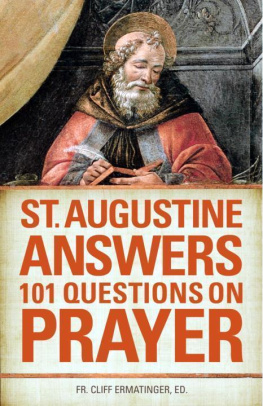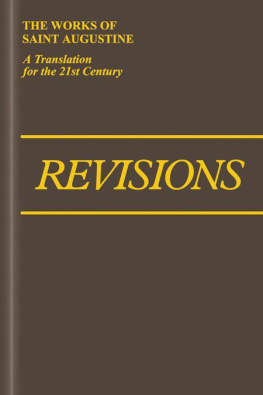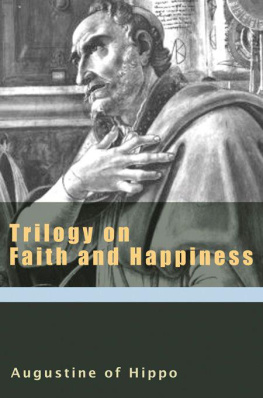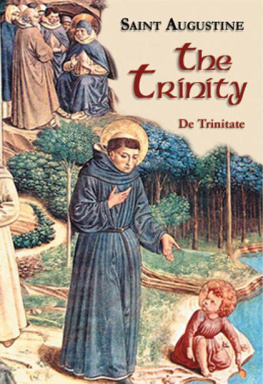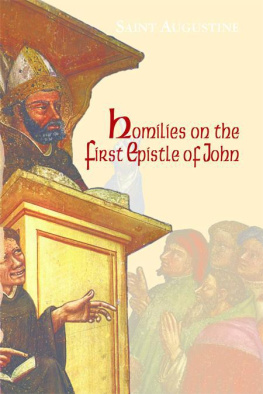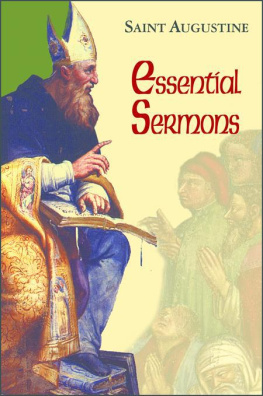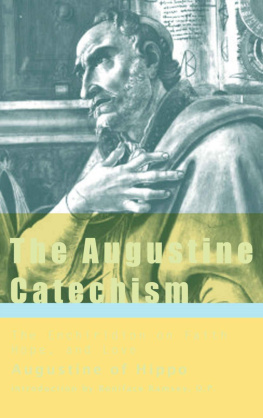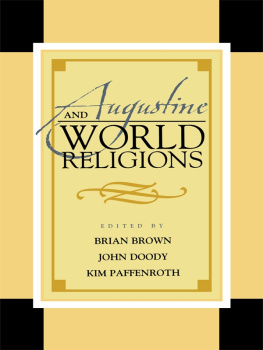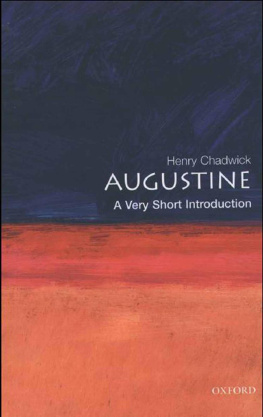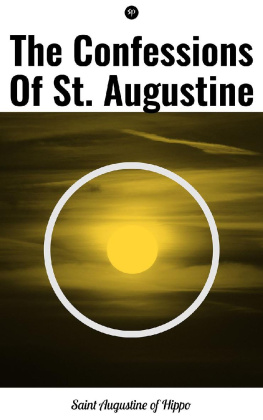St. Augustine
Compiled and edited by
Fr. Cliff Ermatinger





This book is dedicated to my mother, who taught me to love talking with God.

This book would not have been possible without the resources and inspiration provided by Fr. Agostino Trape OSA.
His work introduced me to St. Augustine, and his contagious love for St. Augustine infected me and motivated me to write this book.
Grazie, Padre.
................................ xv
.......... 3
THE NATURE OF PRAYER
GETTING STARTED
.............. 9
........ 11
PRAYER AND THE PRESENCE OF GOD
........ 14
PRAYER AND DESIRE: LONGING FOR GOD
SEEKING GOD IN PRAYER
..................... 19
...... 21
FINDING GOD IN PRAYER
......... 24
PRAYER AND CONVERSION
PRAYER AND GRACE
........ 29
........... 30
PRAYER AND SALVATION
EFFECTIVE PRAYER
....... 40
.. 42
.............. 43
THE EFFECTS OF PRAYER ON THE SOUL
TYPES OF PRAYER
............. 48
PRAYER OF PRAISE
................ 51
. 54
....... 54
PRAYER OF ADORATION
PRAYER OF THANKSGIVING
PRAYER FOR MERCY
PRAYER OF PETITION
............... 63
.... 65
WHAT TO ASK FOR
....... 67
........ 72
..... 74
...... 76
....... 77
WHAT NOT TO ASK FOR
.... 83
PRAYING ALWAYS
....... 85
.............. 85
..... 86
........ 86
........... 87
....... 88
....... 88
.......... 89
CHRIST'S ROLE IN OUR PRAYER
. 92
....... 93
....... 95
ACTION AND CONTEMPLATION
PROGRESS IN PRAYER
......... 101
.......... 102
...... 104
... 106
FINE-TUNING AND MISCELLANEOUS QUESTIONS ON PRAYER
...... 109
.. 110
......... 110
... 111
THE BEGINNING
............................. 121
............. 125
For everything exterior is driven in this direction and that by the world's storms and tribulations. But there is a hermitage within, and there let us examine our faith... there where no man can see is this hermitage, where in hope we rest, as all troubles pass it by.
Sermon 47, 14, 23

All our striving in this life consists in healing the eye of the heart in order to see God.
Sermon 88, 5
"Where is God to be sought?"
"Is he to be sought even though he has been found?"
"If he knows what we need, why does God want us to ask him for what we need?"
"Do we attempt to change God's will when we ask him for things?"
Such were the questions that perplexed a young North African man who, in spite of his brilliant intellect and tenacious will, found no satisfying answers. The answer lay somewhere beyond human nature's most privileged gifts. Augustine Aurelius found the answers to these questions and many more, not through a mere accumulation of data, but ultimately through the experiential knowledge that accompanies an authentic encounter with Christ. This is what St. Paul means when he describes what it is to comprehend with all the holy ones what is the breadth and length and height and depth, and to know the love of Christ that surpasses knowledge (Eph. 3:18-19).
St. Augustine's writings continuously return to this experiential element of the relationship with God, in which he says, "spiritually to touch God a little is a great joy; but to grasp him is entirely impossible."' This experience bears within itself a certain healthy tension. We touch God but cannot grasp him; we know him, but he eludes our understanding. No matter; "it is better to find God without understanding him, than to understand him without finding him."'
It all brings about a burning desire that Augustine defines simply as "prayer."
To understand prayer, according to Augustine, we have to understand what it is to long for God.
Prayer and desire: for the Bishop of Hippo, these are interchangeable terms. Desire is what ensures prayer's interiority, thus saving it from becoming mindless repetition or pagan babbling (cf. Matt. 6:7). Upon desiring God we begin to possess him. Our longing for that which no eye has seen, nor ear heard, nor has it ever entered into the heart of man (cf. 1 Cor. 2:9), brings us to him whom we have desired with our whole being. Under God's grace, this search begins to shape our entire existence with faith, hope, and love and leads us ever deeper into the desire for him.

Much like the young Augustine, we all have some questions about prayer. But, unlike Augustine, most of us seldom come up with our own cogent and convincing answers. The purpose of this little book is to attempt to answer many of the most frequently asked questions I have met in my twenty-plus years of religious life. When confronted with such perplexing questions, I found that, in many cases, the Church Fathers offered a treasury of profound and beautiful solutions. And from amongst the many excellent patristic sources, Augustine increasingly claimed first place, owing to his practical counsels expressed in accessible language.
That's all fine for a quick reference. The only difficulty is that quite often his works do not purport to offer a systematic and complete study of any one topic. Such an approach would come later with the advent of Scholasticism, thanks in great part to that giant of the High Middle Ages, St. Thomas Aquinas.
To obtain a complete picture of what St. Augustine thought about any one topic, one has to read just about everything he ever wrote. That wouldn't be so problematic if he hadn't written more in his seventy-six years of life than most people will ever read in an equally long lifetime. To take our topic, for example, he never wrote a treatise on prayer or developed a formal theology of prayer. The closest he ever came to such an endeavor is his gem of spirituality, Letter 130, in which he counsels the widow Proba on the ways of prayer. With this modest book I seek to go beyond the contents of Letter 130 and bring to the reader the breadth of Augustine's reflections on prayer collected from over two hundred sources.
Perhaps a word of caution is in order. The depth of many of St. Augustine's responses is such that to read too many of them in one sitting can cause a degree of spiritual indigestion. The Greek adage much not many is the counsel to follow for best results. Certainly, this speaks of Augustine's brilliance, but even more so, it reflects God's splendor.

